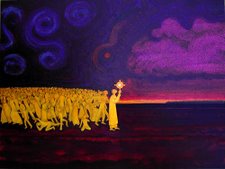
Tiny bottle of Chartreuse in hand, I emerged in mid-town a few weeks ago from watching Into Great Silence,, my promised dinner date long-gone. The two-hour documentary about a monastery that I'd thought I was going to see had morphed into an amazing three-hour experience of silent imagery. Groening’s documentary (he hates the term) of life among the Roman Catholic monks of the Grande Chartreuse monastery in the French Alps opens this week at the Film Forum in New York city, its U.S. theatrical debut. (Visit their site for Zeitgeist Film’s trailer )
Groening requested permission to shoot in 1984. Sixteen years later they got back to him, inviting him to come on in. He did so alone, managing the camera-work and sound as a one-man filmmaking team while keeping the rules of work and silence of the monastery. Their conditions of no artificial light, no additional music, no commentaries, fulfilled exactly Groening’s own initial treatment. The Order of the Carthusians, founded in 1084, supports itself on its green, herbal liqueur so it can devote the lives of its monks and nuns to perpetual, contemplative silence—they live alone together, each in a cell (really a suite of several rooms, with a tiny garden) meeting only for regular prayer vigils. The resulting film, a mix of HD video and super-8 film, is so exquisite and so surprising that critics rave while viewers return as often as they can during its European runs.
--------------------------------------------------
[interesting quote from the interview: "... And it’s very deliberate that I did not do this film on Buddhist monasteries. This is where the collaboration with my friend Nico ended. When we could not get into the monastery he asked, why don’t we go to Tibet? I said I want to do this for myself, to find out why I am so anti-religious, having being brought up so strictly Catholic. I want to heal some wounds and go back and understand where I’ve come from. I cannot understand that by going into a Buddhist monastery. I was not a Buddhist child, and my audience did not have a Buddhist childhood either. There is a problem with all those beautiful films which are for us a sort of religious tourism. Nice, but it’s not really going very deep. Just on a theoretical level there is a mistake in going from the background you come from to an entirely fresh background. The way you know that a religion is your religion is that you have problems with it. If you don’t have problems with it, it’s not your religion."]



No comments:
Post a Comment